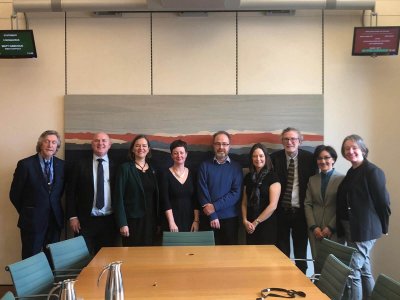The All-Party Parliamentary Group (APPG) on ME held its first meeting on March 3, where biomedical research was discussed. Twenty MPs attended or sent staff to hear about the urgent need for biomedical research, following its inaugural AGM in January.
Chaired by Carol Monaghan MP, the meeting was the first in a series that will focus on key issues facing people with ME in the UK and will culminate in a parliamentary report setting out actions for change.
Members attending heard short presentations from Professor Chris Ponting, University of Edinburgh; Professor Julia Newton, Newcastle University, and Dr Eliana Lacerda, CureME Biobank, before taking the opportunity to ask questions.
Professor Newton began by sharing the story of one of her patients with ME, who waited more than 10 years for a diagnosis, and how patients were being badly let down by lack of high-quality research into both causation and treatment.
Describing symptoms involving the brain, muscles, and immune system, Professor Newton highlighted how clear abnormalities are being found. However, these findings are often based on small research studies with small cohorts, and with small amounts of funding – mainly from the ME charity sector. This must be scaled up if real progress is to be made.
Professor Ponting picked up this point and highlighted the disparity in research funding allocated to ME when compared to many other medical conditions. He presented a compelling case for sustained, ring-fenced investment, suggesting that a UK institute for ME research could be a world-leader.
“Funders must recognise that they need to incentivise early-stage career researchers to enter this field,” he said. “They frequently cite the need for a robust evidence base to support research funding applications – but without funding, it is not possible to achieve this. We must break this vicious cycle.”
Highlighting the huge gains from patients, researchers and charities working together – an example being the recent ME/CFS Biomedical Partnership application he is leading – Professor Ponting stressed the need for further and longer-term funding to sustain this momentum.
Dr Eliana Lacerda gave an overview of the work of the CureME Biobank, and some examples of research where these blood samples are now being used, Dr Lacerda agreed that sustainability and infrastructure are among the significant challenges facing ME researchers.
MPs were taken aback to learn that the basic running costs for the Biobank have all been provided by the ME charity sector, that the bulk of the Biobank’s external research funding has come from the National Institutes of Health in the United States; and that Professor Newton has ceased ME research altogether – despite having access to a large patient cohort – because funding is so difficult to secure.
MPs asked what practical steps they could take to support ME research. Insightful follow-up questions focused on research into similar conditions, the search for biomarkers and the stigma still attached to ME.
The possibility of a rise in post-infectious ME following the Covid19 – Covid19 was being debated in the Chamber at the same time as this meeting – was also highlighted by Professor Ponting, serving to reiterate the seriousness of his intent and the urgent need for proper research investment.
Find a list of MPs who attended this meeting below:
Angus MacNeil MP (representative)
Carol Monaghan MP
Caroline Nokes MP
Edward Davey MP (representative)
Ellie Reeves MP (representative)
Fleur Anderson MP
Jacob Young MP
James Davies MP
Jason McCartney MP
Jim Shannon MP
Kate Green MP (representative)
Laurence Robertson MP
Liz Twist MP (representative)
Mark Tami MP
Michael Tomlinson MP (representative)
Neale Hanvey MP
Sally-Ann Hart MP
Sharon Hodgson MP (representative)
Siobhan Baillie MP
Scott Mann MP
Encourage your MP to attend the next meeting
The next meeting of the APPG will take place on April 29. If you haven’t been in touch with your MP about the APPG but would like to encourage them to attend the next meeting in April, you can find information on how to contact them (and an email template) here. We suggest you refer all MPs to Carol Monaghan’s office for more information and for the location of the meeting.






 ) and a message about #MillionsMissing with your own networks. Desktop: Download by right clicking on the image or clicking on the download icon in the bottom right corner of the image. Mobile:
) and a message about #MillionsMissing with your own networks. Desktop: Download by right clicking on the image or clicking on the download icon in the bottom right corner of the image. Mobile:
2 thoughts on “APPG on ME: Biomedical Research Meeting”
Did people get ME in WW2? There must have been chemicals from all the bombs dropped all over Europe so was there an epidemic for ME?
Mickey Brady is another Northern Ireland MP who attended, first left on the photos over.
Please add his name to the list.
Thankyou
Comments are closed.